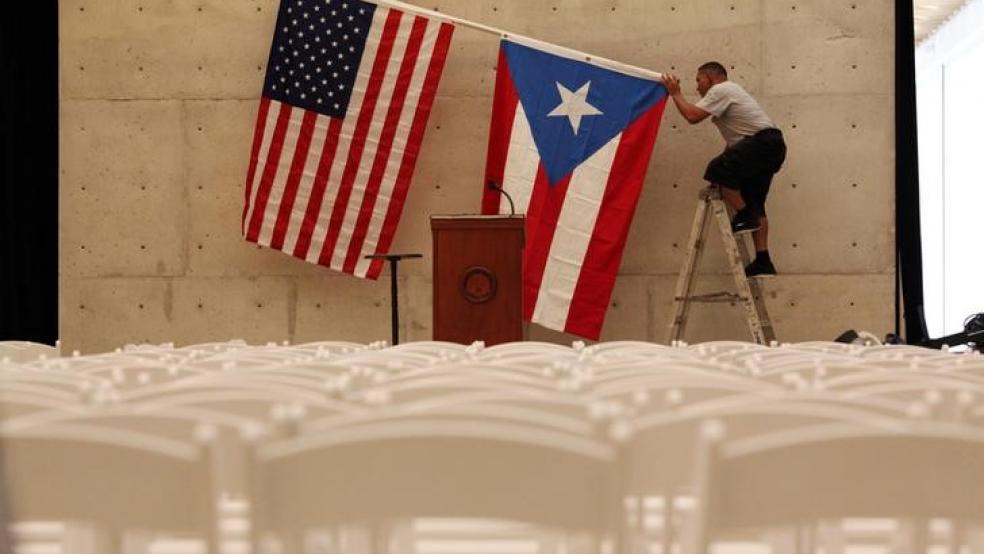SAN JUAN, Puerto Rico — The question of "status," whether Puerto Rico should be admitted as a U.S. state, remain a commonwealth or seek sovereignty — has been an undercurrent of every major policy decision here for the last century.
But rarely has the issue been as prevalent as it is today, with the economy in a recession for a decade and the island triggering the largest municipal bond market bankruptcy in U.S. history in May, a process being overseen by a seven-member oversight board appointed by Washington.
Related: Puerto Rico government bank reaches wind-down deal with creditors
Voters in Puerto Rico will head to the polls on Sunday, for the second time in five years, to share their views on status, as it is known here. Some see statehood as the best way to pull Puerto Rico out of its economic crisis, others blame the U.S. for the malaise and would rather seek independence after five centuries of what they call colonial rule.
The sovereignty view is and has been a minority in Puerto Rico. Statehood was prominent during Puerto Rico's election in November when two pro-statehood candidates won: Ricardo Rossello, a Democrat, became governor and Jenniffer Gonzalez, a Republican, was elected resident commissioner — Puerto Rico's sole representative in U.S. Congress who can write and submit legislation, but doesn't have the authority to vote.
The truth is, whichever way the residents vote, the plebiscite is largely ceremonial. Admittance as the 51st state would require a statute by the U.S. Congress. The last time Puerto Rico voted on the issue in 2012, when a majority opted for statehood, nothing changed. It's largely up to the government to lobby officials in Washington to change the island's status.
"My commitment is when we have the vote, we will use our resources with the government to move forward," Rossello said in an interview with CNBC on Thursday.
Related: Puerto Rico budget to protect pension payments: governor
Now, given Puerto Rico's financial distress, many on the mainland are questioning whether the timing could be any better. The governor insists that statehood isn't about using federal tax dollars to save Puerto Rico. But rather, it would put the island on equal footing with other states, which would improve its economic situation, he said.
"We wouldn't want a bailout. I'm no fan of bailouts. I think we need to assume responsibility for what's going on here," Rossello said. "Statehood is much more than resources. Statehood is an equal playing field for U.S. citizens that reside on the island."
Puerto Ricans have been U.S. citizens since a law made them so in 1917. However, their benefits relative to mainland citizens have been limited. One issue prevalent among many residents is that they pay in full for Medicare, Medicaid and Social Security but can only collect on a restricted amount of these benefits relative to mainland citizens. Thousands of Puerto Ricans serve in the U.S. military but cannot vote for their commander in chief.
In April, President Donald Trump addressed the Puerto Rican financial situation on Twitter, arguing that the Democrats wanted to bail out the island (adding his signature "Sad!" at the end). Both Rossello and Gonzalez have met Trump but have not had the chance to sit down and get his thoughts on Puerto Rico.
Related: Puerto Rico's bankruptcy hearing marks reset of asset scramble
However, Gonzalez said she met with Vice President Mike Pence a few months ago and that he "actually supports statehood for the island."
CNBC sent several emails seeking comment from Pence but they were unanswered.
The unprecedented bankruptcy proceedings taking place is top of mind for many Puerto Ricans as they head to the polls. Puerto Ricans like Maria Colon, 51, a single mom with fibromyalgia, invested in various Puerto Rican bonds and has relied on the monthly interest payments as her main source of income due to her disability. She is now facing nearly $600,000 in losses to date on the bond investments.
Colon said she is voting for statehood in the hopes that if Puerto Rico officially becomes the 51st state, the government will work to find out who was ultimately responsible for this debt crisis, and bring the people of the island the relief and justice that they seek.
Regardless of what happens with the vote, the affairs in Washington have been more intertwined with those on the island than in recent memory. Nearly a year ago, a law was created, known as the Puerto Rican Oversight, Management, and Economic Stablity Act (Promesa), requiring a federally appointed seven-member committee to oversee the finances of the commonwealth, including its fiscal plans and the restructuring of its $73 billion in bond debt and nearly $50 million in unfunded pension obligations.
Gonzalez said this is the first time the island has held a plebiscite vote over statehood where the Justice Department has defined the options on the ballot, making them compatible with U.S. law. In exchange, the DoJ was supposed to contribute $2.5 million to Puerto Rico toward the cost of holding a statehood vote. After reviewing the ballot options in April, the department rejected administering the funds and suggested several changes. Despite making all of the recommended changes to the ballot, to date Puerto Rico has not received any of the promised funds.
Instead, the bankrupt island has spent $7 million.
"This is not about the money; this is more than that," Gonzalez said. "So keep the money. Let us express ourselves. And that is what we are going to have on Sunday."
This article originally appeared on CNBC. Read more from CNBC:
No fear: Wall Street volatility drops to 23-year low
Mark Cuban: ‘When you're 22, 23, 24, there's no such thing as failure’
Would-be snowbirds come home to roost as retirees age in place


